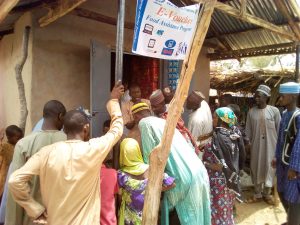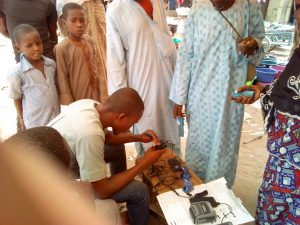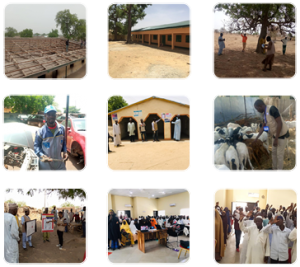WFP Cash-based transfers (CBT) gives beneficiaries leverage to buy food from approved vendors in the market and be more in charge of key choices that affect their lives
“we thank WFP for this support. What they have been doing for us is immeasurable. They have alleviated our sufferings; they have eradicated hunger from our midst“
April 2018 – The World Food Program, WFP has been providing lifesaving support to communities affected by Boko Haram insurgency in Nigeria’s Northeast region with an estimated 4.7 million people in need of emergency food assistance in Borno, Adamawa, and Yobe states.

WFP Cash Based Transfer Beneficiaries purchasing choice food items from vendors in Gujba LGA
Yobe State, situated at the border with Niger and surrounded by Borno, Gombe, Bauchi and Jigawa States, has an economy that is largely dependent on agriculture; hence it is considered fragile with chronic under-development, food insecurity as well as general poverty characterizing the social and economic fabric of the State, WFP’s 2016 Emergency Food Security Assessment in Gujba & Gulani LGA, shows, with a large number (approximately 1.6 million) of this population been displaced into other neighboring communities, IOM 2017 Displacement Tracking Matrix further indicates.
Most recently the number of IDPs has declined slightly as military gains against Boko Haram have enabled some returns, but this scale of population movement has worsened the food security situation, as returning refugees and IDPs add to the strain on the need for food in both camps and host communities, thus causing extreme levels of food insecurity/hunger.
The United Nation World Food Program WFP as part of its lifesaving intervention has introduced Cash Base Transfer in Gujba Local Government Area of Yobe State for March 2018.
The Cash Based Transfer, supervised and monitored by Centre for Community Development and Research Network (CCDRN) in six affected communities of Gujba LGA, was held in-between 24 to 31 March 2018.
WFP provides food assistance to some 1.1 million people monthly in Northeast Nigeria. Increasingly, food assistance comes through cash-based transfers (CBT) that allow beneficiaries to buy food in the market and be more in charge of key decisions that affect their lives
The affected Yobe communities are Mandunari, Dadingel, Buni Lawanti, Buni Yadi, Gujba and Wagir communities. Gujba LGA has a total household of 8,211 with 19 registered vendors and 51 retails shops that gave them food stuffs of their choice within the range of twenty two thousand naira (N22000) for each beneficiary at their respective communities across Gujba LGA. Gujba Community has 2,833 households with 12 retails shops, wagir has 969 households with 9 retails shops, Buni Yadi has 1942 households with 11 retail shops, Buni Lawanti has 1339 households with 9 retails shops, Mandinari has 742 households with 6 retails shops and Dadingel has 386 households with 6 retails shops respectively.
Visibly ecstatic community members where full of gratitude for WFP’s intervention. Wakil Ibrahim from Gujba says “we thank WFP for this support. What they have been doing for us is immeasurable. They have alleviated our sufferings; they have eradicated hunger from our midst. This effort has enabled us to get the food items of our choice and this has helped to reduce hunger tremendously in our communities”

CCDRN team using Mpos device to verify WFP CBT Beneficiaries in Gujba LGA, Yobe state
Since 2014, Boko Haram activities have amplified the food and nutrition insecurity of vulnerable communities already distraught by poverty, hunger and general lack of development. WFP intervention has helped bring succor to the affected population.
“This is a very good initiative that has given us joy as a community. Every month we get help from WFP. I must assure you that I love what happened this month because we have been given the chance to choose what we want” says Maryam Ibrahim, adding that, “we remain grateful to WFP for this help it has brought to us. We were suffering before but now things have change. This is very good”
WFP partnered Center for Community Development and Research Network, to supervise and monitor the cash based transfer across six (6) targeted wards in Gujba LGA of Yobe State.
Prior to the commencement of this exercise, advocacy and sensitization visits were taken to each of the six communities by CCDRN sensitization team to Inform, educate and enlighten stakeholders including community leaders, Vendors and beneficiaries about the change of the distribution system from General Food Distribution (GFD) to Cash Based Transfer (CBT), informing them about venue, address and names of each vendors, date and time frame of the purchasing.
According to reports, throughout 2017, WFP has been distributing food and cash assistance (including mobile phone-based transfers) to more than one million people monthly in Yobe, Adamawa and Borno, the states hardest hit by the crisis. Those receiving assistance included displaced people living in camps or host communities, as well as vulnerable members of host communities and people returning home after months of displacement.
